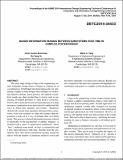Biased Information Passing Between Subsystems Over Time in Complex System Design
Author(s)
Austin-Breneman, Jesse; Yu, Bo Yang; Yang, Maria
DownloadBiased information.pdf (1.501Mb)
PUBLISHER_POLICY
Publisher Policy
Article is made available in accordance with the publisher's policy and may be subject to US copyright law. Please refer to the publisher's site for terms of use.
Terms of use
Metadata
Show full item recordAbstract
The early stage design of large-scale engineering systems challenges design teams to balance a complex set of considerations. Established structured approaches for optimizing complex system designs offer strategies for achieving optimal solutions, but in practice sub-optimal system-level results are often reached due to factors such as satisficing, ill-defined problems or other project constraints. Twelve sub-system and system-level practitioners at a large aerospace organization were interviewed to understand the ways in which they integrate sub-systems. Responses showed sub-system team members often presented conservative, worst-case scenarios to other sub-systems when negotiating a trade-off as a way of hedging their own future needs. This practice of biased information passing, referred to informally by the practitioners as adding “margins,” is modeled with a series of optimization simulations. Three “bias” conditions were tested: no bias, a constant bias and a bias which decreases with time. Results from the simulations show that biased information passing negatively affects both the number of iterations needed to reach and the Pareto optimality of system-level solutions. Results are also compared to the interview responses and highlight several themes with respect to complex system design practice.
Date issued
2014-08Department
MIT Institute for Data, Systems, and Society; Massachusetts Institute of Technology. Department of Mechanical Engineering; Massachusetts Institute of Technology. Engineering Systems DivisionJournal
Volume 7: 2nd Biennial International Conference on Dynamics for Design; 26th International Conference on Design Theory and Methodology
Publisher
American society of Mechanical Engineers
Citation
Austin-Breneman, Jesse, Bo Yang Yu, and Maria C. Yang. “Biased Information Passing Between Subsystems Over Time in Complex System Design.” Volume 7: 2nd Biennial International Conference on Dynamics for Design; 26th International Conference on Design Theory and Methodology (August 17, 2014).
Version: Final published version
ISBN
978-0-7918-4640-7